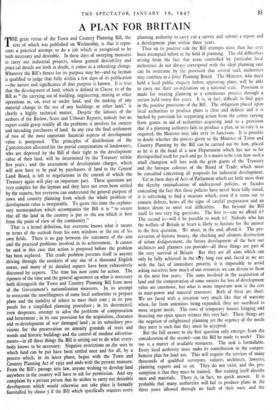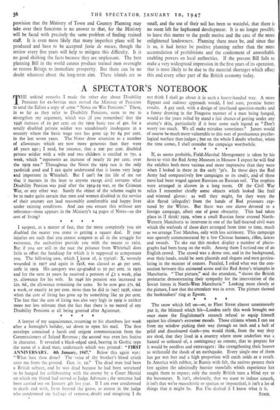A PLAN FOR BRITAIN
THE great virtue of the Town and Country Planning Bill, the text of which was published on Wednesday, is that it repre- sents a practical attempt to do a job which is recognised to be both necessary and desirable. In these days of sweeping measures to carry out industrial projects, whose general desirability and praot:cal details are both in doubt, it comes as a refreshing change.
Whatever the Bill's fitness for its purpose may be—and no layman is qualified to judge that fully within a few days of its publication the nature and significance of that purpose is known. It is true that the development of land, which is defined in Clause to of the Bill as " the carrying out of building, engineering, mining or other operations in, on, over or under land, and the making of any material change in the use of any buildings or other land," is clearly a highly technical matter. Despite the labours of the authors of the Barlow, Scott and Uthwatt Reports, nobody but an expert could grasp readily all the problems it involves for owners and intending purchasers of land. In any case the final settlement of two of the most important financial aspects of development value is postponed. The principles of distribution of the L300,000,000 allocated for the partial compensation of landowners, who are deprived by the Bill of their right to the development value of their land, will be determined by the Treasury within five years ; and the assessment of development charges, which will now have to be paid by purchasers of land to the Central Land Board, is left to negotiations in the control of which the Treasury again will play an important part. These questions are very complex for the layman and they have not even been settled by the experts, but everyone can understand the general purpose of town and country planning from which the whole problem of development value is inseparable. To quote this time the explana- tory memorandum which accompanies the Bill it is " to secure that all the land in the country is put to the use which is best from the point of view of the community."
That is a broad definition, but everyone knows what it means to terms of the outlook from his own windows or the use of his own fields. There is no gap between the statement of the aim and the practical problems involved in its achievement. It cannot be said in this case that action is proposed before the problem has been explored. The crude problem presents itself to anyone driving through the outskirts of any one of a thousand English towns, and many of its detailed aspects have been exhaustively discussed by experts. The time has now come for action. The ripeness of the time and the general agreement on what is necessary both distinguish the Town and Country Planning Bill from most of the Government's nationalisation measures. In its attempt to overcome the unwillingness of some local authorities to prepare plans and the inability of others to meet their cost ; in its pro- posals for a simplified planning procedure ; in its determined, even desperate, attempt to solve the problems of compensation and betterment ; in its vast provision for the acquisition, clearance and re-development of war damaged land ; in its subsidiary pro- visions for the preservation on amenity grounds of trees and woods and historic buildings and the control of outdoor advertise- ments—in all these things the Bill is setting out to do what every- body knows to be necessary. Negative restrictions on ,the uses to which land can be put have been settled once and for all, by a process which, in its latest phase, began with the Town and Country Planning Act of 1932 and ends with the present measure. From the Bill's passage into law, anyone wishing to develop land anywhere in the country will have to ask for permission. And any complaint by a private person that he wishes to carry out desirable development which would otherwise not take place is formally forestalled by clause 5 if the Bill which specifically requires every planning authority to carry cut a survey and submit a report and a development plan within three years.
Thus on its positive side the Bill attempts more than has ever been attempted before in the field of planning. The old difficulties arising from the fact that areas controlled by particular local authorities do not always correspond with the ideal planning unit can be overcome by the provision that several such authorities may combine in a Joint Planning board. The Minister, who must hold a local public enquiry before approving plans, will be able to carry out their co-ordination on a national scale. Provision is made for treating planning as a continuous process through a review held every five years. It is, in fact, difficult to find gaps in the positive provisions of the Bill. The obligation placed upon local authorities to produce plans is clear and definite and it is backed by provision for supporting action from the centre varying from grants in aid of authorities acquiring land to a provision that if a planning authority fails to produce a plan, or to vary it as required, the Minister may take over its functions. It is possible to doubt whether the powers given to the Minister of Town and Country Planning by the Bill can be carried out by him, placed as he is at the head of a new Department which has not so far distinguished itself for push and go. It remains to be seen how such a small champion will fare with the grim giants of the Treasury and the baroque colossus of the Board of Trade, which must be consulted concerning all proposals for industrial development.
Yet in these days of Acts of Parliament which are little more than the sketchy rationalisation of undiscussed policies, or facades concealing the fact that those policies have never been fully stated, it is refreshing to find a measure which, even if it turns out to contain defects, bears all the signs of careful preparation and an honest desire to meet real difficulties. But beyond the Bill itself lie two very big questions. The first is—can we afford it? The second is—will it be possible to work it? Nobody who has the welfare of Britain at heart is likely to hesitate for the answer to the first question. We must, in the end, afford it. The pre- servation of historic beauty, the checking and ultimate destruction of urban disfigurement, the future development of the best our architects and planners can provide—all these things are part of the very survival of Britain. But they are all aims which can only be fully achieved in the vZi'y long run and, faced as we are with the fact of immediate poverty, it is impossible to avoid asking ourselves how much of our resources we can devote to them in the next few years. The sums involved in the acquisition of land and the compensation of some owners for loss of development value are enormous, but what is more important now is the cost in man-power and material resources. Both of these are short. We are faced with a situation very much like that of wartime when, far from amenities being expanded, they are sacrificed to more urgent needs. The rows of temporary houses fringing and bisecting our open spaces witness this very fact. These things are the negation of enlightened planning yet the urgency of the needs they meet is such that they must be accepted.
But the full answer to the first question only emerges from the consideration of the second—can the Bill be made to work? This too is a matter of available resources. The task is formidable.
Every lcal authority must make its contribution to the compre- hensive plan for land use. This will require the services of many thousands of qualified surveyors, valuers, architects, lawyers, planning experts and so on. They do not exist, and the pre- sumption is that they must be trained. But training itself absorbs men and materials. There is, in fact, no quick answer. It is probable that many authorities will fail to produce plans in the three years allowed through no fault of their own, and the provision that the Ministry of Town and Country Planning may take over their functions is no answer' to that, for the Ministry will be faced with precisely the same problem of finding trained staff. It is even more likely that many imperfect plans will be produced and have to be accepted faute de mieux, though the review every five years will help to mitigate this difficulty. It is no good shirking the facts because they are unpleasant. The best planning Bill in the world cannot produce trained men overnight or restore Britain to immediate prosperity. But there can be no doubt whatever about the long-term aim. These islands are so small, and the use of their soil has been so wasteful, that there is no room left for haphazard development. It is no longer possible to leave this matter to the profit motive and the care of the more enlightened landowners. Planning there must be, and since that is so, it had better be positive planning rather than the mere accumulation of prohibitions and the conferment of unworkable enabling powers on local authorities. If the present Bill fails to make a very widespread impression in the first years of its operation, that is most likely to be due to the material shortages which affect this and every other part of the British economy today.



































 Previous page
Previous page